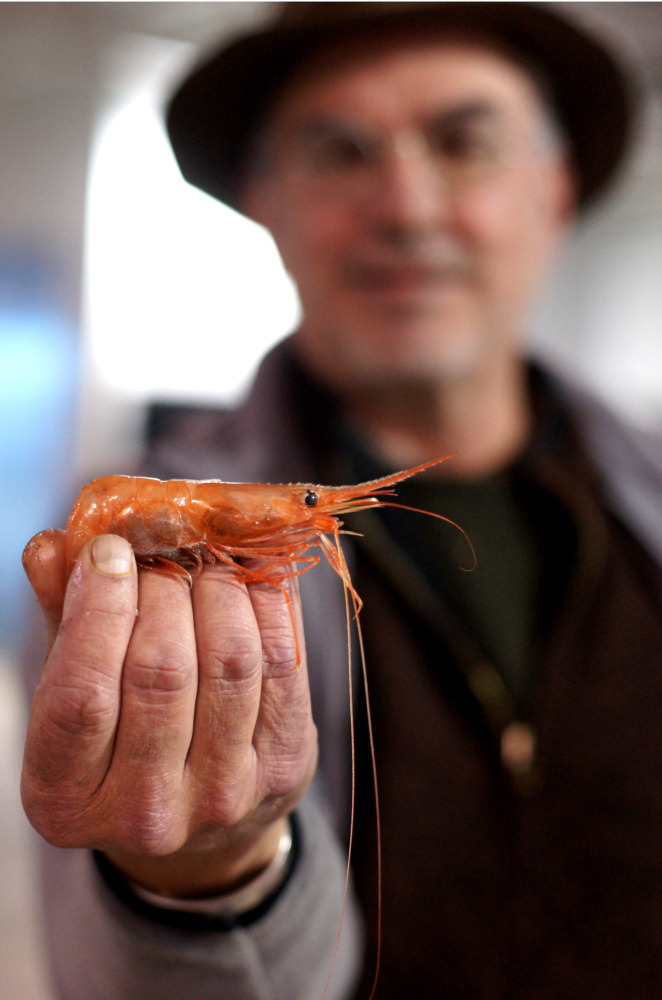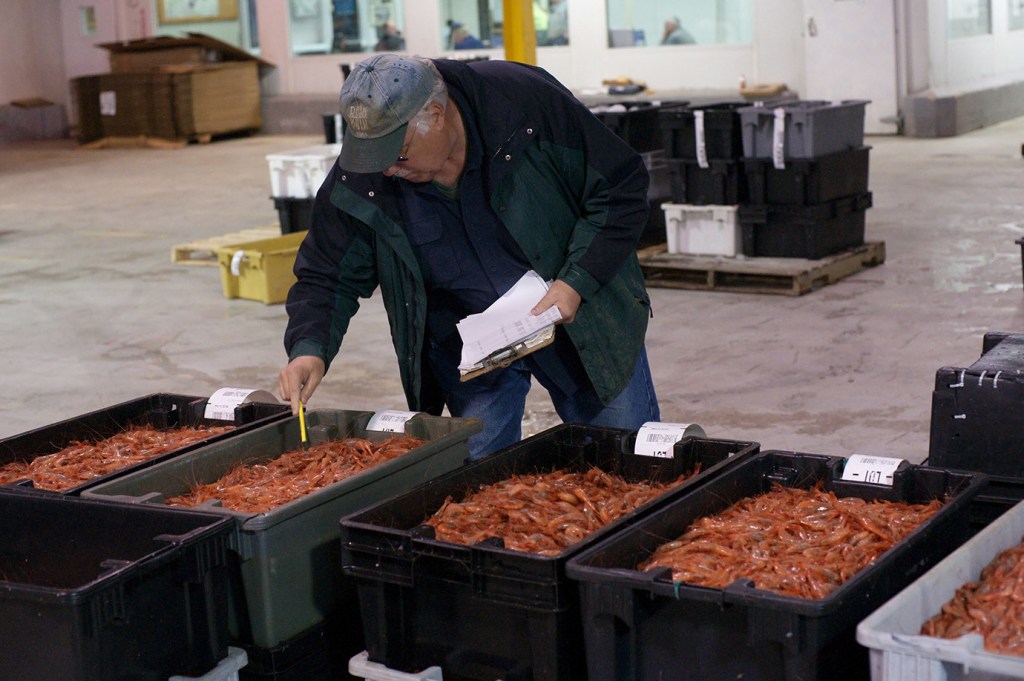Buyers snatched up 1,200 pounds of Maine shrimp at the Portland Fish Exchange on Thursday, paying an average $4.02 per pound, a record price and more than twice what shrimp fetched in 2013.
But there is no reason for shrimp fishermen to celebrate just yet.
The record price stems from scarcity. Just like last year, the commercial shrimp season remains closed because of low stocks. The shrimp that sold at auction Thursday were caught by one of the three Maine fishermen involved in a sampling project to help state biologists track the timing of egg hatch, size, gender and developmental stages of the shrimp.
The three fishermen – based in Portland, Stonington and South Bristol – must make five fishing trips between Feb. 1 and March 20 for the project. Thursday was the first time during the project that Portland fisherman Vincent Balzano harvested enough shrimp to sell at the exchange.
Balzano said he was “shocked” his shrimp sold for more than $4 a pound.
Before the auction, he had no idea what the catch was worth because there are no Maine shrimp in the marketplace. In 2013, the last year there was a commercial shrimp season, dealers paid fishermen an average of $1.81 a pound, a record high at the time. Balzano said the highest price that year was around $2.50 a pound.
FEW SHRIMP IN THE MARKETPLACE
On Thursday, George Parr, a Portland fish wholesaler, bought more than 800 pounds for a Japanese buyer who will sell the shrimp to sushi restaurants around the country. He said the shrimp are prized for their sweet flavor.
“This will all be gone before Sunday,” he said, standing next to 14 plastic totes of shrimp displayed in the auction house’s refrigerated warehouse.
The other buyers were Smitty’s, a seafood company in New York City, and Harbor Fish Market, a retailer on the Portland waterfront.
Sandy MacIver, a buyer for Emerald Seafood, located in New York, was outbid and failed to get any shrimp. Figuring out a bid price was a “shot in the dark,” he said, because it’s unclear what consumers would pay for Maine shrimp, which are called northern shrimp outside of Maine.
The price was high Thursday because there are so few shrimp in the marketplace. But if fishermen someday start catching them in large numbers again, MacIver said, prices may be low because shrimp have been missing from restaurant menus for too long.
“They’ll have to develop that market all over again,” he said.
SHRIMP FISHERY AT RECORD-LOW LEVELS
A small but valuable part of the state’s fishing industry, shrimp landings were valued at $1.01 million in 2013, down from $6.6 million in 2010, the last year there was a healthy harvest. Maine fishermen typically catch 85 percent to 90 percent of the annual harvest in the Gulf of Maine.
Once plentiful, the shrimp population in the Gulf of Maine is at record-low levels. The current population is estimated to be at only 3 percent of the average population dating to 1984, when scientists began monitoring the species.
Normally, there are no limits to how much shrimp fishermen can harvest in a day. But fishermen who take part in the state survey are restricted to catching 1,800 pounds a day.
Balzano caught the shrimp over a five-hour period, a big improvement over his first trip three weeks ago when he caught only 420 pounds over five hours.
He harvested the shrimp Wednesday outside the harbor just east of the Portland buoy at a depth of 40 to 60 fathoms, which is where the shrimp are usually found this time of year, he said. In another good sign, the shrimp are dropping eggs right on schedule.
Balzano won the contract after responding to a request for proposals from the Atlantic States Marine Fisheries Commission, which manages the shrimp harvest. A small portion of the catch is packed into plastic bags and distributed to biologists at the Maine Department of Marine Resources and the University of Maine.
In addition to the three Maine trawlers, one out of Gloucester gathers samples in Massachusetts waters, and there are five Maine-based trappers who collect samples but are not allowed to sell shrimp commercially.
Although Wednesday’s catch was good, the program isn’t a big moneymaker, Balzano said, because he has to harvest shrimp even when the catch is poor and barely covers his costs.
“I’m not doing this for the money,” he said. “I’m doing this for the future of the fishery. We need more information so we can all make better decisions – harvesters and managers.”
Send questions/comments to the editors.




Comments are no longer available on this story